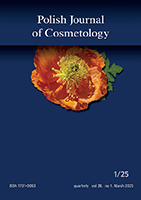search by
Copyright @ Pol J CosmetolPractice of obtaining informed consent for invasive cosmetology proceduresWaldemar Głusiec, Małgorzata Łukasiak Zakład Etyki i Filozofii Człowieka, Wydział Nauk o Zdrowiu, Uniwersytet Medyczny w Lublinie Summary Introduction. Hyaluronic acid injections, laser procedures, permanent make-up and mesotherapy are examples of invasive cosmetology treatments that pose a threat of health complications. Although current legal provisions do not impose the necessity of obtaining consent for such procedures, beauty salon employees are more frequently asking for such a consent in writing. Obtaining informed consent is a sign of awareness of the moral and legal responsibility for provided services. Aim. The main aim of this research was to examine the practice of obtaining informed consent for invasive procedures offered by beauty salons in Lublin. Material and methods. Research was carried out using an author made questionnaire. It was conducted on 40 employees of 16 beauty salons in Lublin - 20 cosmetologists and 20 beauticians. Results. Research results indicate that the educational level of beauty salon employees has an impact on their decisions on the necessity to obtain informed consent from the client for offered procedures. In comparison to beauticians´ education, academic preparation of cosmetologists translates into their meticulousness in obtaining written consent for invasive cosmetology procedures intheir professional practice. Conclusions. Cosmetologists more often than cosmetologists obtain written consent for an invasive cosmetology procedure. They also provide the client with necessary information about the procedure, both in written and oral form more frequently. However, they are less likely to make sure that a minor client understands the risks associated with a chosen procedure. Key words: informed consent, cosmetology, hyaluronic acid, laser treatments, permanent make-up, mesotherapy |




